Contact Us
Table of Contents
Search Site
Google listing of all pages on this website
Site Map
Toby
Johnson's Facebook page
Toby
Johnson's YouTube channel
Toby Johnson on Wikipedia
Toby
Johnson Amazon Author Page

Secure site at
https://tobyjohnson.com
Also on this
website:
As an Amazon Associate
I earn from qualifying purchases.
Toby
Johnson's books:
Toby's books are available as ebooks from
smashwords.com, the Apple iBookstore, etc.

FINDING
YOUR OWN TRUE MYTH: What I Learned
from Joseph Campbell: The
Myth
of the
Great Secret
III

GAY
SPIRITUALITY:
The Role of Gay Identity in the Transformation of Human Consciousness

GAY PERSPECTIVE:
Things Our Homosexuality Tells Us about the Nature of God and the
Universe

SECRET MATTER, a sci-fi novel with
wonderful "aliens" with an
Afterword by Mark Jordan

GETTING
LIFE IN PERSPECTIVE:
A
Fantastical Gay Romance set in two different time periods

THE FOURTH QUILL, a
novel about attitudinal healing and the problem of evil
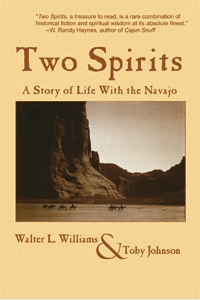
TWO SPIRITS: A Story of Life with
the
Navajo, a collaboration with Walter L. Williams

CHARMED
LIVES: Spinning Straw into
Gold: GaySpirit in Storytelling, a collaboration with
Steve Berman and some 30 other writers

THE MYTH OF THE GREAT
SECRET:
An
Appreciation of Joseph Campbell

IN SEARCH OF GOD IN THE
SEXUAL UNDERWORLD: A Mystical Journey

FINDING
GOD IN THE SEXUAL UNDERWORLD: The Journey Expanded
Unpublished manuscripts
About ordering
Books on
Gay Spirituality:
White
Crane Gay Spirituality Series


Articles
and Excerpts:
Review of Samuel
Avery's The
Dimensional Structure of Consciousness
Funny
Coincidence: "Aliens Settle in San Francisco"
About Liberty Books, the
Lesbian/Gay Bookstore for Austin, 1986-1996
The Simple Answer to the Gay Marriage Debate
A
Bifurcation of Gay Spirituality
Why gay people should NOT Marry
The Scriptural Basis for
Same Sex Marriage
Toby and Kip Get Married
Wedding Cake Liberation
Gay Marriage in Texas
What's ironic
Shame on the American People
The "highest form of love"

Gay Consciousness
Why homosexuality is a sin
The cause of homosexuality
The
origins of homophobia
Q&A
about Jungian ideas in gay consciousness
What
is homosexuality?
What
is Gay Spirituality?
My three
messages
What
Jesus said about Gay
Rights
Queering
religion
Common
Experiences Unique to Gay
Men
Is there a "uniquely gay
perspective"?
The
purpose of homosexuality
Interview on the Nature of
Homosexuality
What the Bible Says about
Homosexuality
Mesosexual
Ideal for Straight Men
Varieties
of Gay Spirituality
Waves
of Gay Liberation Activity
The Gay Succession
Wouldn’t You Like to Be Uranian?
The Reincarnation of
Edward Carpenter
Why Gay Spirituality: Spirituality
as Artistic Medium
Easton Mountain Retreat Center
Andrew Harvey &
Spiritual Activism
The Mysticism of
Andrew Harvey
The
upsidedown book on MSNBC

Enlightenment
"It's
Always About You"
The myth of the Bodhisattva
Avalokitesvara
Joseph
Campbell's description of
Avalokiteshvara
You're
Not A Wave
Joseph Campbell Talks
about Aging
What is Enlightenment?
What is reincarnation?
How many lifetimes in an
ego?
Emptiness & Religious Ideas
Experiencing experiencing experiencing
Going into the Light
Meditations for a Funeral
Meditation Practice
The way to get to heaven
Buddha's father was right
What Anatman means
Advice to Travelers to India
& Nepal
The Danda Nata
& goddess Kalika
Nate Berkus is a bodhisattva
John Boswell was Immanuel Kant
Cutting
edge realization
The Myth of the
Wanderer
Change: Source of
Suffering & of Bliss
World Navel
What the Vows Really
Mean
Manifesting
from the Subtle Realms
The Three-layer
Cake
& the Multiverse
The
est Training and Personal Intention
Effective
Dreaming in Ursula LeGuin's The Lathe of Heaven

Gay
Spirituality
Curious
Bodies
What
Toby Johnson Believes
The
Joseph Campbell Connection
The
Mann Ranch (& Rich Gabrielson)
Campbell
& The Pre/Trans Fallacy
The
Two Loves
The
Nature of Religion
What's true about
Religion
Being
Gay is a Blessing
Drawing Long Straws
Freedom
of Religion

The
Gay Agenda
Gay
Saintliness
Gay
Spiritual Functions
The subtle workings of the spirit
in gay men's lives.
The Sinfulness of
Homosexuality
Proposal
for a study of gay nondualism
Priestly Sexuality
Having a Church to
Leave
Harold Cole on Beauty

Marian Doctrines:
Immaculate Conception & Assumption
Not lashed to the
prayer-post
Monastic or Chaste
Homosexuality
Is It Time to Grow
Up? Confronting
the Aging Process
Notes on Licking
(July, 1984)
Redeem Orlando
Gay Consciousness changing
the
world by Shokti LoveStar
Alexander Renault
interviews Toby
Johnson

Mystical Vision
"The
Evolution of Gay Identity"
"St. John of the
Cross & the Dark Night of
the Soul."
Avalokiteshvara
at the Baths
Eckhart's Eye
Let Me
Tell You a Secret
Religious
Articulations of the
Secret
The
Collective Unconscious
Driving as
Spiritual Practice
Meditation
Historicity
as Myth
Pilgrimage
No
Stealing
Next
Step in Evolution
The
New Myth
The Moulting of the Holy Ghost
Gaia
is a Bodhisattva

The Hero's
Journey
The
Hero's Journey as archetype -- GSV 2016
The Gay Hero Journey
(shortened)
You're
On Your Own
Superheroes

Seeing
Differently
Teenage
Prostitution and the Nature of Evil
Allah
Hu: "God is present here"
Adam
and Steve
The Life is
in the Blood
Gay retirement and the "freelance
monastery"
Seeing with
Different Eyes
Facing
the Edge: AIDS as an occasion for spiritual wisdom
What
are you looking for in a gay science fiction novel?

The Vision
The
mystical experience at the Servites' Castle in Riverside
A Most Remarkable
Synchronicity in
Riverside
The
Great Dance according to C.S.Lewis

The Techniques Of The
World Saviors
Part 1: Brer Rabbit and the
Tar-Baby
Part 2: The
Bodhisattva Avalokiteshvara
Part 3: Jesus
and the Resurrection
Part 4: A
Course in Miracles

The
Secret of the Clear Light
Understanding
the Clear Light
Mobius
Strip
Finding
Your
Tiger Face
How Gay Souls Get Reincarnated

Joseph
Campbell, the Hero's Journey, and the modern Gay Hero-- a five part
presentation on YouTube

About Alien Abduction
In
honor of Sir Arthur C Clarke
Karellen was a homosexual
The
D.A.F.O.D.I.L. Alliance
Intersections
with the movie When We Rise
More
about Gay Mental Health
Psych
Tech Training
Toby
at the California Institute
The
Rainbow Flag
Ideas for gay
mythic stories

People
Kip and Toby,
Activists
Toby's
friend and nicknamesake Toby Marotta.
Harry
Hay, Founder of the gay movement
About Hay and The New Myth
About
Karl
Heinrich Ulrichs, the first
man to really "come out"
About Michael Talbot, gay mystic
About Fr. Bernard Lynch
About Richard Baltzell
About Guy Mannheimer
About David Weyrauch
About
Dennis Paddie
About Ask the Fire
About
Arthur Evans
About
Christopher Larkin
About Mark Thompson
About Sterling Houston
About Michael Stevens
The Alamo Business
Council
Our friend Tom Nash
Second March on
Washington
The
Gay
Spirituality Summit in May 2004 and the "Statement
of Spirituality"

Book
Reviews
Be Done on Earth by Howard
E. Cook
Pay Me What I'm Worth by
Souldancer
The Way Out by Christopher
L Nutter
The Gay Disciple by John Henson
Art That Dares by Kittredge Cherry
Coming Out, Coming Home by Kennth
A. Burr
Extinguishing
the Light by B. Alan Bourgeois
Over Coffee: A conversation
For Gay
Partnership & Conservative Faith by D.a. Thompson
Dark Knowledge
by
Kenneth Low
Janet Planet by
Eleanor
Lerman
The
Kairos by Paul E. Hartman
Wrestling
with Jesus by D.K.Maylor
Kali Rising by Rudolph
Ballentine
The
Missing Myth by Gilles Herrada
The
Secret of the Second Coming by Howard E. Cook
The Scar Letters: A
Novel
by Richard Alther
The
Future is Queer by Labonte & Schimel
Missing Mary
by Charlene Spretnak
Gay
Spirituality 101 by Joe Perez
Cut Hand: A
Nineteeth Century Love Story on the American Frontier by Mark Wildyr
Radiomen
by Eleanor Lerman
Nights
at
Rizzoli by Felice Picano
The Key
to Unlocking the Closet Door by Chelsea Griffo
The Door
of the Heart by Diana Finfrock Farrar
Occam’s
Razor by David Duncan
Grace
and
Demion by Mel White
Gay Men and The New Way Forward by Raymond L.
Rigoglioso
The
Dimensional Stucture of Consciousness by Samuel Avery
The
Manly Pursuit of Desire and Love by Perry Brass
Love
Together: Longtime Male Couples on Healthy Intimacy and Communication
by Tim Clausen
War
Between Materialism and Spiritual by Jean-Michel Bitar
The
Serpent's Gift: Gnostic Reflections on the Study of Religion by
Jeffrey J. Kripal
Esalen:
America and the Religion of No Religion by Jeffrey J. Kripal
The
Invitation to Love by
Darren Pierre
Brain,
Consciousness, and God: A Lonerganian Integration by Daniel A
Helminiak
A
Walk with Four Spiritual Guides by Andrew Harvey
Can Christians Be Saved? by Stephenson & Rhodes
The
Lost Secrets of the Ancient Mystery Schools by Stephenson &
Rhodes
Keys to
Spiritual
Being: Energy Meditation and Synchronization Exercises by Adrian
Ravarour
In
Walt We
Trust by John Marsh
Solomon's
Tantric Song by Rollan McCleary
A Special Illumination by Rollan McCleary
Aelred's
Sin
by Lawrence Scott
Fruit
Basket
by Payam Ghassemlou
Internal
Landscapes by John Ollom
Princes
& Pumpkins by David Hatfield Sparks
Yes by Brad
Boney
Blood of the Goddess by William Schindler
Roads of Excess,
Palaces of
Wisdom by Jeffrey Kripal
Evolving
Dharma by Jay Michaelson
Jesus
in Salome's Lot by Brett W. Gillette
The Man Who Loved Birds by Fenton Johnson
The
Vatican Murders by Lucien Gregoire
"Sex Camp"
by
Brian McNaught
Out
& About with Brewer & Berg
Episode One: Searching for a New Mythology
The
Soul Beneath the Skin by David Nimmons
Out
on
Holy Ground by Donald Boisvert
The
Revotutionary Psychology of Gay-Centeredness by Mitch Walker
Out There
by Perry Brass
The Crucifixion of Hyacinth by Geoff Puterbaugh
The
Silence of Sodom by Mark D Jordan
It's
Never About What It's About by Krandall Kraus and Paul Borja
ReCreations,
edited by Catherine Lake
Gospel: A
Novel
by WIlton Barnhard
Keeping
Faith: A Skeptic’s Journey by Fenton Johnson
Dating the Greek Gods by Brad Gooch
Telling
Truths in Church by Mark D. Jordan
The
Substance of God by Perry Brass
The
Tomcat Chronicles by Jack Nichols
10
Smart
Things Gay Men Can Do to Improve Their Lives by Joe Kort
Jesus and the Shamanic Tradition of Same Sex Love
by Will Roscoe
The
Third Appearance by Walter Starcke
The Last Hours of Ancient Sunlight by Thom Hartmann
Surviving
and Thriving After a Life-Threatening Diagnosis by Bev Hall
Men,
Homosexuality, and the Gods by Ronald Long
An Interview
with Ron Long
Queering Creole Spiritual Traditons by Randy
Conner & David Sparks
An Interview with
Randy Conner
Pain,
Sex
and Time by Gerald Heard
Sex
and the Sacred by Daniel Helminiak
Blessing Same-Sex Unions by Mark Jordan
Rising Up
by
Joe Perez
Soulfully
Gay
by Joe Perez
That
Undeniable Longing by Mark Tedesco
Vintage: A
Ghost
Story by
Steve Berman
Wisdom
for the Soul by Larry Chang
MM4M a DVD
by Bruce Grether
Double
Cross
by David Ranan
The
Transcended Christian by Daniel Helminiak
Jesus
in Love by Kittredge Cherry
In
the Eye of the Storm by Gene Robinson
The
Starry Dynamo by Sven Davisson
Life
in
Paradox by Fr Paul Murray
Spirituality for Our Global Community by Daniel
Helminiak
Gay & Healthy in a Sick Society by Robert A.
Minor
Coming Out: Irish Gay Experiences by Glen O'Brien
Queering
Christ
by Robert Goss
Skipping
Towards Gomorrah by Dan Savage
The
Flesh of the Word by Richard A Rosato
Catland by
David Garrett Izzo
Tantra
for Gay Men by Bruce Anderson
Yoga
&
the Path of the Urban Mystic by Darren Main
Simple
Grace
by Malcolm Boyd
Seventy
Times Seven by Salvatore Sapienza
What
Does "Queer" Mean Anyway? by Chris Bartlett
Critique of Patriarchal Reasoning by Arthur Evans
Gift
of
the Soul by Dale Colclasure & David Jensen
Legend of the Raibow Warriors by Steven McFadden
The
Liar's
Prayer by Gregory Flood
Lovely
are the Messengers by Daniel Plasman
The Human Core of Spirituality by Daniel Helminiak
3001:
The Final Odyssey by Arthur C. Clarke
Religion and the Human Sciences by Daniel Helminiak
Only
the
Good Parts by Daniel Curzon
Four
Short
Reviews of Books with a Message
Life
Interrupted by Michael Parise
Confessions of a Murdered Pope by Lucien Gregoire
The
Stargazer's Embassy by Eleanor Lerman
Conscious
Living, Conscious Aging by Ron Pevny
Footprints Through the Desert by Joshua Kauffman
True
Religion by J.L. Weinberg
The Mediterranean Universe by John Newmeyer
Everything
is God by Jay Michaelson
Reflection
by Dennis Merritt
Everywhere
Home by Fenton Johnson
Hard Lesson by James
Gaston
God
vs Gay?
by Jay Michaelson
The
Gate
of Tears: Sadness and the Spiritual Path by Jay Michaelson
Roxie
&
Fred by Richard Alther
Not
the Son He Expected by Tim Clausen
The
9 Realities of Stardust by Bruce P. Grether
The
Afterlife Revolution by Anne & Whitley Strieber
AIDS
Shaman:
Queer Spirit Awakening by Shokti Lovestar
Facing the Truth of Your Life by Merle Yost
The
Super Natural by Whitley Strieber & Jeffrey J Kripal
Secret
Body by
Jeffrey J Kripal
In
Hitler's
House by Jonathan Lane
Walking on Glory by Edward Swift
The
Paradox
of Porn by Don Shewey
Is Heaven for Real? by Lucien Gregoire
Scissors,
Paper, Rock by Fenton Johnson
Toby
Johnson's
Books on Gay Men's Spiritualities:

Gay Perspective
Things Our [Homo]sexuality
Tells Us
about the
Nature of God and
the Universe
Gay
Perspective is available as an audiobook narrated
by Matthew Whitfield. Click
here

Gay Spirituality
Gay Identity and
the Transformation of
Human Consciousness
Gay
Spirituality is now
available as an audiobook, beautifully narrated by John Sipple. Click here

Charmed
Lives: Gay Spirit in Storytelling
edited by
Toby Johnson
& Steve Berman

Secret
Matter
Lammy Award Winner for Gay
Science Fiction
updated

Getting Life in
Perspective
A Fantastical Romance
Getting
Life in Perspective is available as an
audiobook narrated by Alex Beckham. Click
here

The Fourth Quill
originally published
as
PLAGUE
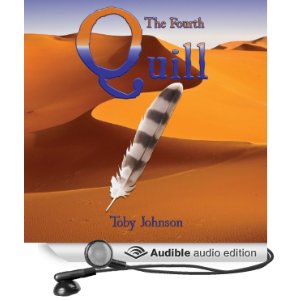
The Fourth Quill is
available
as an audiobook, narrated by Jimmie
Moreland. Click here

Two Spirits: A Story of
Life
with the Navajo
with Walter L. Williams
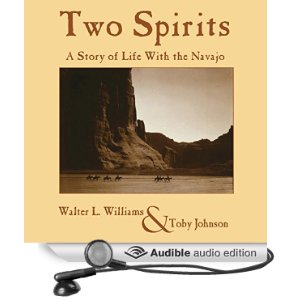 Two
Spirits is available as an
audiobook narrated by Arthur Raymond. Click
here Two
Spirits is available as an
audiobook narrated by Arthur Raymond. Click
here

Finding
Your Own True Myth: What I Learned from Joseph
Campbell
The
Myth
of the
Great Secret III

In Search of God in the Sexual Underworld

The Myth of the Great
Secret: An Appreciation of Joseph Campbell.
This
was the second edition of this book.

Toby Johnson's
titles are
available in other ebook formats from Smashwords.
|
Finding Your Own
Myth:
What I Learned from Joseph Campbell
It's The Myth of the Great
Secret
III
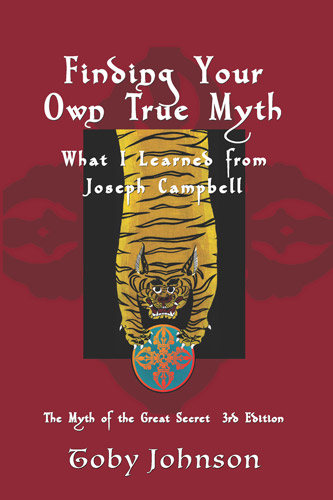
From Joseph Campbell, the
renowned comparative religions and mythology scholar, Toby Johnson
derived his central insight that there is a “new myth” arising in human
consciousness. This is the understanding of the nature of myth itself,
a “meta-myth,” the “myth of myth,” according to which our lives are
always giving us clues to the secret of our true and deepest nature,
and our salvation comes from following our own unique clues.
One of the clues that many cultures share is the
tradition of the “wise
old man,” the elder who serves as guide, teacher, and companion,
helping others on the path to enlightenment. When Toby Johnson, a young
Catholic seminarian, left the monastery on his own unconventional
spiritual journey, he had the good fortune to find such a teacher in
the person of Joseph Campbell. Johnson says in the introduction: Joe
demonstrated how to gently leave behind the naïve religiousness of
youth and find wonder, meaning, and bliss in a new post-mythic, but
re-mythologized, spiritual consciousness.
Johnson's spiritual/philosophical autobiography, Finding Your Own
True Myth—The Myth of the Great Secret III, is both a
loving memorial to Campbell and an original extension of his work.
Johnson, later a psychotherapist, religions scholar, novelist, and gay
spirituality writer, offers insight into the vital role that myth—and
insight into myth—play in the modern world and inspiration for anyone
seeking coherence and meaning. A wealth of personal anecdotes and
teaching stories are woven throughout the text to provide practical
applications for these lessons and concrete examples of their power to
change lives.
“The
Myth of the Great Secret is a jewel of a book. I have read it with
deep fascination, enchanted not only by the graceful style…but also by
the skill of your presentation… And I think the way you have put
together all that we have been learning from each other in all those
meetings and encounters, all up and down the state of California, is
really wonderful. The book is the definitive chronicle of our ‘Queste
del Saint Graal’…”
Finding Your Own
True Myth: What I Learned from Joseph Campbell—The Myth of the Great
Secret III is a “spiritual autobiography” of
Johnson's life as a young Catholic
boy joining Catholic religious life after high school and going off to
the monastery—which was actually just college most of the time, but
living in a religious community and going through a daily series of
religious practices. During that time, he discovered the field of
Comparative Religions and, specifically, Joseph Campbell. From learning
about Buddhism and other religions, Johnson came to a new, modern
understanding of what religion is really about. He argues that this is
what everybody’s going through now in some way as religiousness adjusts
to the modern, scientific world. The field of comparative religions
teaches one to think about religion from over and above, outside any
particular set of doctrines. Such thinking produces a kind of
“meta-myth,” an explanation for oneself of how all these various myths
fit together.
The term in the title “The Myth of the Great Secret” refers to this
“meta-myth” or “myth about myth.” Everybody feels like there’s
something we need or ought to know to make our lives better and more
meaningful and satisfying. Religion has tended to answer that need with
its stories about higher reality. That “something” that inspires us is
a secret, a Great Secret that pushes us to assume higher and higher
perspectives to make sense of everything.
After Johnson left religious life in the pivotal year 1970, he moved to
San Francisco and continued his studies of comparative religion at the
California Institute of Asian Studies (now the California Institute of
Integral Studies). The next year he attended a weekend seminar that
Joseph Campbell taught at The Mann Ranch Seminars, a retreat center out
in the country north of San Francisco. He got a job at that retreat
center and spent some 5 summers there. The Mann Ranch Seminars was
loosely modeled on Esalen Institute down in Big Sur. Through the Mann
Ranch Johnson made friends with Campbell and corresponded with him for
some ten years. Johnson was part of the crew that assisted at
Campbell's appearances in the Bay Area through most of the decade.
Joseph Campbell read the first edition of this book and wrote a nice
letter about it: "I think the way you have put together all that
we have all been learning from each other in those meetings and
encounters, up and down the state of California, is really wonderful.
The book is the definitive chronicle of our ‘Queste del Saint Graal’ of
the seventies.” This letter is included in the second and third
editions of this
book.
Campbell used the expression “The New Myth” to mean whatever is coming
in the future that will replace our current religions, the way they
replaced the religions before them. Toby Johnson argues that “the new
myth” IS the realization of the nature of myth.
Joseph Campbell thought the image of “Earthrise” — the Earth rising
above the
lunar horizon — symbolized the modern ability to look back upon oneself
from outside. The astronauts seeing earth from the moon are like
humanity seeing itself from over and above. That’s the modern
perspective.
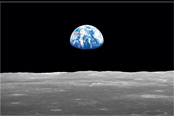
Johnson does talk about himself as a
gay man and gay mental health activist in the book, but this is not a
“gay book” the way most of his others are. It’s about the recognition
that myths and religious doctrines are symbols about the nature of
consciousness. Waking up to that reality frees us from the rigidity of
old time religion, while allowing us to believe in a “greater reality”
that gives clues to itself—i.e., clues to the secret—through the events
of our lives. For gay and lesbian people this is a very helpful way to
understand religion. It allows us to reject the stuff that doesn’t fit.
Johnson only half-jokingly fancies himself “Joseph Campbell’s apostle
to the gay community."
This idea is what’s behind the internet term “Spiritual, not
religious.” And the notion of the “secret” resonates with what people
mean when they say they are “agnostic,” i.e., that they don't know.
Another expression of this idea was coined by California Institute
Founder Frederic Spiegelberg in the phrase: “The Religion of No
Religion."

Interwoven into Johnson's autobiography is material about Campbell,
modern physics, the history of Buddhism, Meister Eckhart and medieval
Catholic mysticism, Carl Jung and the phenomenon of synchronicity, the
Gaia Hypothesis, and, especially, the story of the Bodhisattva
Avalokiteshvara.
This last is the Buddhist myth about a world savior who saves the world
by
taking on everybody’s future reincarnations for them—so we are all
really Avalokiteshvara reincarnating in fulfillment of his vow to be
everybody. And religion and myth have been the clues Avalokiteshvara is
giving himself about who he really is and what's actually going on with
human existence.
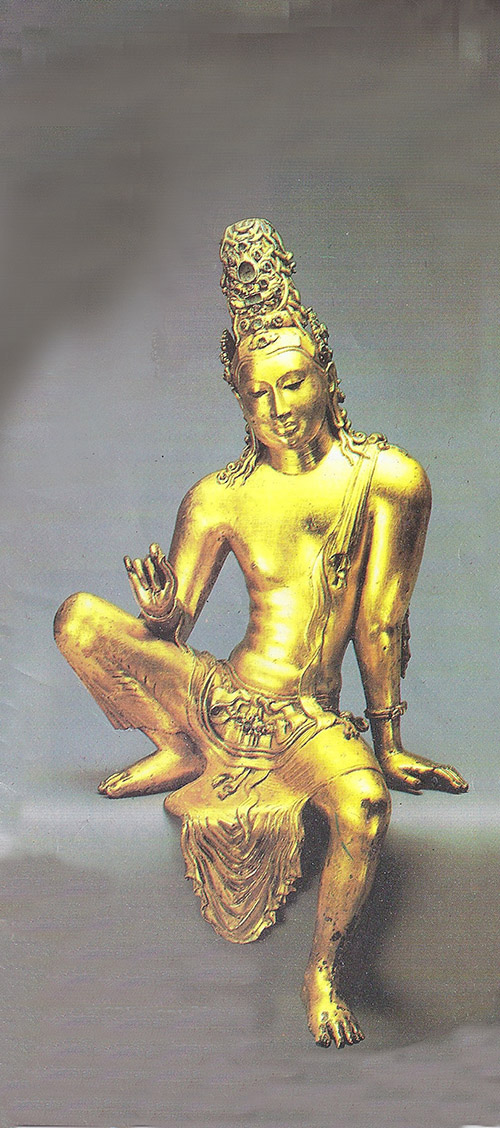
Avalokiteshvara,
by the way, is a
fairly familiar-looking Buddhist statue. In male form he is
Avalokiteshvara. In female form she is Kuan Yin. The original Northern
Indian image was of him as an androgynous male in the form of a
bare-chested youth sitting in a relaxed lotus position, wearing women’s
clothes or
jewelry.
It is said there are Three Wonders of the Bodhisattva.
The first is
that “he” sees that there is no difference between samsara and nirvana,
between time and eternity—This is It, right now. The second is that
“he” is both male and female. And the Third Wonder is that the first
two wonders are the same.
Within the course of the book, there are two symbols used for the
central idea of the “Great Secret.” They are the Tibetan icon of the
double dorje or vajra (lightning bolt), and the image of the inner
nature of the Self as a tiger.
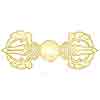
Lightning is an icon for Enlightenment as a sudden bolt of insight.
Ancient Tibetans believed diamonds were formed by lightning striking
the earth and congealing. The symbol for the lightning bolt is that
dumbbell shaped figure (there are two of them crossing each other in
the “double dorje”). The prongs come from the sceptres of the old-gods
who hurled lightning bolts—like the Greek god Neptune with this trident.
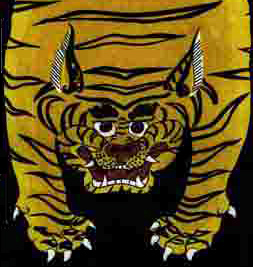
The tiger image refers to Campbell’s story that perhaps we all have to
pretend we’re goats because we’ll be killed (like Jesus and Hallaj) if
we acknowledge what and who we “really are” — which is tigers. So the
tiger is a symbol of the deepest Self—which has “power.”
The central story of Toby Johnson's
book is about
Campbell giving a lecture on the Tibetan Book of the Dead. Johnson was
operating the slide projector. Campbell had intentionally left one of
the slots in the carousel empty, so when he got to the stage of “The
Clear Light”—what the Buddhists say is the way straight to nirvana at
death—and Johnson clicked the slide and there was no slide, just bright
white light, he immediately clicked to the next slide. And then
Campbell explained that is what everybody does at the moment of death.
Because we aren’t expecting it, when the Clear Light appears, we reject
it and move on—which in Buddhism means falling back into reincarnation.
Symbolically it means we are surprised at the Truth because it isn’t
what we were expecting.
And that is because it is a secret!
Here's the original 1st edition cover, published by William Morrow
& Co. in 1980. The image was chosen by Toby Johnson's editor Jim
Landis from a sample of "cross-like" icons Johnson prepared for Landis.
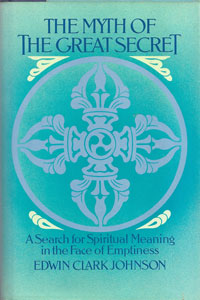
Here's the revised edition cover,
published by Celestial Arts, in 1992.
Here's a photo of the first edition, which was in
hardcover only, in
Joseph Campbell's library at the Pacifica Graduate Center Campbell/Gimbutas
Archives (as the library has been reproduced with every book
where Joe had had it in his Manhattan apartment on Waverly Place).
The
original edition of this book contained a chapter called "The Dream of
the Ipse Solus," the self alone, which discussed Ursula LeGuin's novel
The Lathe of Heaven and Werner Erhard's est Training. A portion of that
chapter appears here at ipsesolus.html
In Finding Your Own True Myth, I mentioned several works of art that I
said are posted to my website. They appear in different articles, but
here they are altogether:
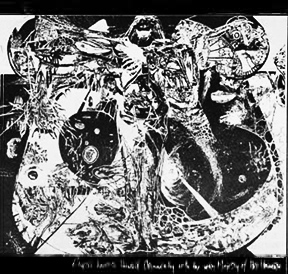
Christ Invests Himself Organically with the Very
Majesty of His Universe
by Michael Dvortcsak
from the article on this website: Jesus and
the
Resurrection
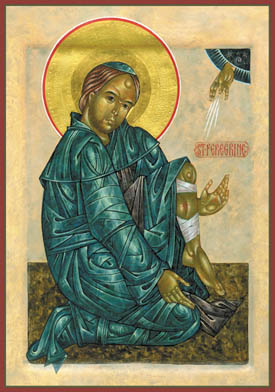
St Peregrine Icon by Nicholas Markell
Avalokiteshvara dressed like Saint Peregrine from the article Pilgrimage

Chenraizee (Avalokiteshvara in Tibetan) as Our Lady of Guadalupe
by Ralfka Gonzales
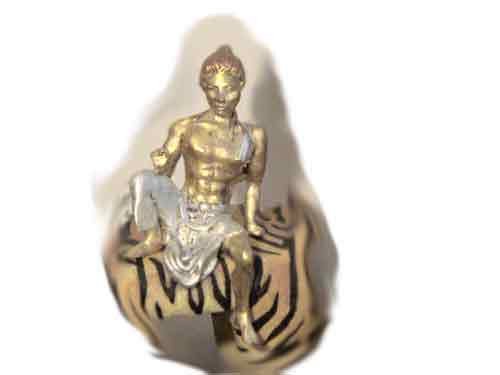
Avalokiteshvara sculpture by Kip Dollar
Here's a wonderful description of the Bodhisattva by Joseph Campbell

The worn dorje and bell on Toby's altar
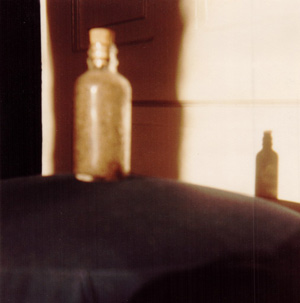
The bottle incrusted with sea sand, and smelling faintly of spearmint, that Monty (the Buddha) gave me
———
Reviews of Finding Your Own True Myth
Will Roscoe wrote:
A deep dive into the power and relevance of myth
Finding Your Own True Myth is a deep dive into
the power and relevance of myth. The author draws from Eastern
religion, philosophy and psychotherapy, and the many lessons of a long
and rich life, inspired by his great mentor, Joseph Campbell. —
Will Roscoe, author of Queer Spirits: A Gay Men’s Myth Book and Jesus and the Shamanic Tradition of Same-Sex Love.
Dennis Merritt wrote:
Johnson interweaves his impressive knowledge of religions and their
myths ...
Johnson interweaves his impressive knowledge of
religions and their myths with stories of his own journey through life
in teaching how we can each create our own myths, the myth we choose to
define ourselves, the myths we use to map our journey finding our own
bliss.
For those interested in comparative religion, what the spiritual
quest means today, this is a great read. Inspired by the author's
connection with Joseph Campbell who studied and understood the common
themes in the myths of all the major and minor religions of the World.
(How important was Joseph Campbell? Remember the 'myth's of the
original Star Wars? Luke? Trying to learn the 'force', Yoda the
spiritual teacher, the old masters, and Darth Vader representing the
dark forces... That all came out of their consultation with Joseph
Campbell. Those were great movies. Been supplanted by a lot of CGI
graphic wizardry in the later movies.) Follow your Bliss. (Joseph
Campbell as well.)
Toby Johnson is extremely well read, and intertwines a history of
religious thought with his own life's journey expanding on Campbell's
ideas to how we can each create the myths that shape our lives, can
reach for the Bliss Joseph Campbell described.
Toby Johnson writes:
Dennis Merritt is author of the wonderful and mind-blowing book Reflection.
This book has come through my life twice (1992 & 2017) and each
time it's been an affirmation and reminder of the Great Secret theme in
my life. Dennis Merritt is like the guy in the
"Interlude" chapter who
leans across the table and says: "Let me tell you a secret…"
Jerry L. Wheeler wrote a very nice review in
Out in
Print:
Unlike some other atheists, I certainly have nothing against
spirituality. Anything that helps you examine your own life and your
relationship to those around you and the world in general is a positive
thing. Self-reflection is a wonderful tool and one that is in all too
rare use these days. In his time as seminarian, monk, author, lecturer,
psychotherapist, Toby Johnson’s experiences and insights rival those of
his mentor, Joseph Campbell, and many of them are laid out in this
third edition of what may become Johnson’s Leaves of Grass, The
Myth of the Great Secret.
This edition focuses on Johnson’s relationship with and assimilation of
the teachings of myth-master Joseph Campbell, providing well-chosen
anecdotes as well as teaching stories to illustrate his points. Johnson
also includes a great deal of personal history pertinent to his own
path, but he never intimates his journey must be your own. One of the
points he stresses is that the spiritual search is an extremely
individual one, and what works for some may not for others. His example
provides both a model and a point of departure for those on their own
mythic hunt.
If all of this sounds frightfully boring, it’s not. Johnson uses his
novelist’s skills to infuse a bit of life into what could have been a
very dry read and also uses his own history as a gay man to make his
philosophical points salient to other gay men. This common ground
proves indispensable in making the material accessible. And although
Johnson always comes back to Joseph Campbell, he uses Campbell’s
myth-making to include Eastern religious modalities, occultism, and
even parapsychology, ranging far and wide among these subjects to bring
us a gestalt of the lessons he has learned.
Finding Your Own True Myth, then, is more of an
instruction booklet than dogma, presenting possibilities and
potentialities that the reader can choose from. It provides a light by
which you can walk your own path, and in these days of homogenized,
ready-made belief systems, that’s an invaluable service.
JW
© 2018 Jerry L. Wheeler
Rollan McCleary wrote:
The book helps the reader to better understand a whole
period of time and range of cultures
Toby Johnson has been and remains an important figure in the expression
of the gay spirituality which has been spreading since the seventies in
America into the wider world. From being a former seminarian, a Servite
friar and would-be physicist he would become a gay activist,
journalist, novelist, editor, therapist and you name it. So it is
therefore of real interest to know more about TJ’s background and his
colourful views in the way this well written book allows and also to
know more about the renowned mythologist Joseph Campbell. This
writer-guru of the “follow your bliss” mantra, greatly influenced
Johnson at a crucial stage and Johnson had the privilege of personally
knowing him as opposed to Thomas Merton and Barnabas Ahern without whom
perhaps he might not have been so open to Campbell. The book helps the
reader to better understand a whole period of time and range of ideas,
some of which they might dissent from even while under the umbrella of
the same gay spirituality they would agree in seeking to realize and
affirm.
Gay spirituality it seems to me goes in basically two directions. It
can be an inquiry into, explanation and expression of one’s personal
and cultural individuality as a gay person, or, on the basis that
gayness can avoid the Yin/Yang dualities heterosexuality imposes,
“acceptance” seeks to include everyone and everything on a
quasi-buddhist basis within an evolutionary plan to which gay
consciousness will contribute something, even much. TJ is very much of
the latter “mystical” as opposed to “philosophical/theological”
persuasion, and is even its chief spokesperson today. A problem with
this latter path for me as a gay theologian who believes in an
objective not metaphorical gay aura and whom long residence in Asia
can’t permit me to be idealistic about Asian faiths, is that any
Buddhist no-self doctrine has no real room for the individualism that
being gay is about and the high self awareness needed to manage oneself
in society. I even believe that “the story of ourselves”, gay or
otherwise, that Campbell believed we make up as we go along and the
“synchronicities” that TJ sets so much store by for guidance, are in
fact largely given in advance by the celestial pattern at birth. Thus
Campbell’s hero’s journey, less universal than he assumed, had a lot to
do with his being born under very self-aware and combative Aries.
In following Campbell, TJ takes myth a long and radical Jungian way to
the point good and evil become purely relative, there’s no eternity
there’s only “now”, there’s no God unless we’re God ourselves, there’s
only Life (which is a grand opera which hurts) and all religions are
true as metaphors only. The latter point leads to something we do need
to know if only because, again, we might wish to dissent from or make
variation upon it, even while affirming TJ’s gay spirituality with its
insights for life and culture more generally. Influenced by hints from
Campbell, TJ believes the next myth, the myth of myths, the secret myth
that’s evolving, a form of consciousness in itself that gays can
contribute to or spearhead, is the identity of all religions. Because
it’s sometimes too easy to be drawn into generalizations and lured by
symbols, it seems to me it’s important to be clear that this idea
beyond all the various insights of TJ’s writings across the years, is
the core vision now being presented and this marks a direction many
could never follow. Which the author wouldn’t object to because he is
all for freedom and openness. Toby Johnson is a fascinating, and
thought provoking character, a perennial hippie of the mind. His book
which updates, including autobiographically, a work issued years ago,
is an excellent insight into, and for many would be a fine introduction
to, his life and work.
Richard Alther Wrote:
Johnson is the contemporary visionary in the spirit of
Joseph Campbell
Toby Johnson is both a scholar and seductive truth-seeker of the
highest order. What a wonderful accomplishment is this book that
seamlessly weaves earthbound matters of bettering one's life (and, more
importantly, the lives of all others) with accessible, lyrical prose to
help the reader stretch beyond the mundane imprisonment of the ego.
Whether expanding upon religious faith is one's concern, or exploring
spiritual alternatives altogether, Johnson beautifully inspires us to
embark on that journey. The book is invaluable alone for interpreting
the extraordinary life and thoughts and legacy of Joseph Campbell.
Salvatore Sapienza wrote:
"The real subject of every myth is YOU."
"The myths of the world's different religions are all metaphors for the
experience of being alive. We experience being God by living fully
right now," writes Toby Johnson in "Finding Your Own True Myth." Though
the book serves as Johnson's spiritual autobiography (from his calling
as a religious brother in the Catholic Church to his embrace of
interfaith mysticism to his success as an award-winning writer and
editor of gay spirituality), "Finding Your Own True Myth" ultimately
serves as a guidebook, pointing the way for the reader to explore
his/her own spiritual journey and to discover the "myth of great
secret," one of the aims of the spiritual life. As indicated in the
subtitle, Johnson intersperses the book with stories of his friendship
with Joseph Campbell, the great 20th Century American mythologist, who
taught him that "the real subject of every myth is you." Johnson's
spiritual autobiography is an interesting mix of academia, personal
anecdotes and storytelling. I came away not only inspired by Johnson's
and Campbell's wisdom, but also encouraged to explore my own "hero's
journey" and to discover my own true myth.
Tony Frost [Lucien Gregoire] wrote:
What is this all about?
It’s about why young people describe themselves on Internet profiles as
‘spiritual, non-religious.’
Insofar as the synonym of ‘spiritual’ is ‘religious,’ just what are
these people talking about?
Toby Johnson tells us what they are talking about.
“A new myth is developing all around
us…
It is
the understanding of the mythic dimension of consciousness. It’s how
you make sense of the clash between religion and science… In each
person, if one has the eyes to see, resides divinity.”
The existence of the ‘indestructible soul’ cannot be challenged as long
as one does not know what it is. Billions of people bank their eternity
on the existence of something religion leaves undefined. Each one with
their own vision. Each one with their own spirituality. Each one
with their own myth.
Finding Your Own True Myth is much more than just another book.
Glimpse your own indestructible soul.
|



![]()
